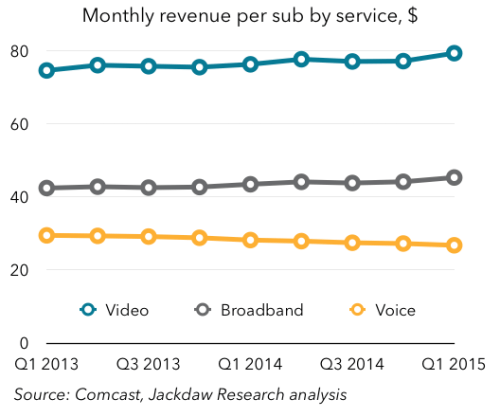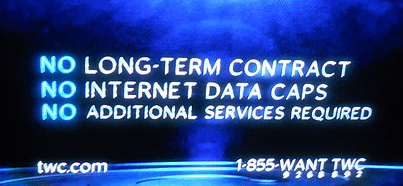 Cox Communications will begin testing overlimit fees this summer starting in its Cleveland, Ohio service area with plans to introduce hard usage allowances and excess usage violation charges nationwide if customers tolerate the market test in Cleveland.
Cox Communications will begin testing overlimit fees this summer starting in its Cleveland, Ohio service area with plans to introduce hard usage allowances and excess usage violation charges nationwide if customers tolerate the market test in Cleveland.
DSL Reports learned that Cox will formally notify customers beginning May 19 it has increased broadband usage allowances and will introduce an overlimit fee of $10 for each 50GB allotment a customer exceeds their limit starting this fall.
Cox’s marketing machine is attempting to justify its usage based pricing scheme with a pre-written script to appease anticipated customer complaints:
A draft customer support script obtained exclusively by DSLReports states that this lead-in period will “give customers the opportunity to familiarize themselves with their typical data usage and take action, such as secure their WiFi network or change service plans, if they exceed their limit.”
The script also notes that customers will be notified via e-mail and a browser popup when they’ve reached 85% and 100% of their monthly data allotments. Cox services like Cox TV Connect, Cox Digital Telephone and Cox Home Security will not count toward the usage cap, a Cox insider claims.
To make the idea of potential bill shock more palatable to their customer base, Cox generously increased usage allowances last week:
- Starter: 150 GB/month
- Essential 250 GB/month
- Preferred 350 GB/month (the most popular plan)
- Premier 700 GB/month
- Ultimate 2 TB/month
Exceed those limits and the company will slap penalty fees on your bill as a matter of “fairness.” Customers will get a preview of any specific overlimit fees they would incur starting in June, but the company will not begin to actually charge them until October.
 “Data usage plans promote fairness by asking the high-capacity Internet users to pay a greater share of network costs,” argues Cox. “Some critics of data usage plans push a flat fee pricing model, meaning that users would pay a flat fee whether they simply use the Internet to surf the web and check email or if they are a ‘super user’ and consume copious amounts of bandwidth. Data usage plans are a far more fair approach, giving consumers a choice based on their personal needs rather than forcing all customers to absorb the network costs incurred by the 5% of customers who exceed their allowance.”
“Data usage plans promote fairness by asking the high-capacity Internet users to pay a greater share of network costs,” argues Cox. “Some critics of data usage plans push a flat fee pricing model, meaning that users would pay a flat fee whether they simply use the Internet to surf the web and check email or if they are a ‘super user’ and consume copious amounts of bandwidth. Data usage plans are a far more fair approach, giving consumers a choice based on their personal needs rather than forcing all customers to absorb the network costs incurred by the 5% of customers who exceed their allowance.”
Stop the Cap! would point out we’ve heard those same talking points since 2009 and they were not credible then and are even less so today.
First, we’d note Cox is attacking the business plans of some of the most successful broadband providers in the United States. Time Warner Cable, Cablevision, Google, and a myriad of other phone and cable operators not only deliver on their commitment to offer unlimited use Internet, they actually market it as a good reason to buy Internet access from them.
Cox’s concerns for fairness might be a bit less hypocritical had Cox not sold customers unlimited use plans for years. Were they being unfair to their customers then, now, or both?
Second, the company’s claimed noble intentions for keeping the cost of broadband down might be more believable if it didn’t charge its base customers a whopping $34.99 a month for “up to 5Mbps” Internet that it now wants to limit. Five years ago it charged customers just $21.99 a month for that service. By 2015, it had raised the price more than 59%.
In comparison, Time Warner Cable charges less than half that for unlimited “$14.99 Everyday Low Price Internet” – a tier that has not increased in price since its introduction. Time Warner has also offered its light users an optional plan to win a discount if they keep their usage down. As a reflection of customer interest in plans that place limits (even optional) on broadband service, out of some 11 million Time Warner Cable customers, only a few thousand have shown any interest in plans that introduce a usage allowance component.
 Third, Cox’s excuses are very similar to those given by Time Warner Cable when it tried (and failed spectacularly) to impose usage allowances on its broadband customers in 2009. Time Warner officials promised it would represent greater fairness and would help pay for network improvements, while only a small percentage of customers would face higher charges. In fact, none of those claims were true. Customers seeking to keep unlimited access faced a tripling of the cost of broadband, Time Warner Cable only committed to network improvements in their most-populous service areas (which were excluded from the usage cap market trials and had significant competition), and at the usage caps Time Warner proposed in 2009 – 5, 10, 20, and 40GB, more than half of today’s Time Warner customers would be subject to overlimit fees. At the time, Time Warner claimed their proposed usage allowances were generous and fewer than 5% of customers would exceed them. That is eerily familiar to the “5% of customers” Cox refers to today.
Third, Cox’s excuses are very similar to those given by Time Warner Cable when it tried (and failed spectacularly) to impose usage allowances on its broadband customers in 2009. Time Warner officials promised it would represent greater fairness and would help pay for network improvements, while only a small percentage of customers would face higher charges. In fact, none of those claims were true. Customers seeking to keep unlimited access faced a tripling of the cost of broadband, Time Warner Cable only committed to network improvements in their most-populous service areas (which were excluded from the usage cap market trials and had significant competition), and at the usage caps Time Warner proposed in 2009 – 5, 10, 20, and 40GB, more than half of today’s Time Warner customers would be subject to overlimit fees. At the time, Time Warner claimed their proposed usage allowances were generous and fewer than 5% of customers would exceed them. That is eerily familiar to the “5% of customers” Cox refers to today.

The real money is to be made selling broadband, already amazingly profitable.
Cox’s need for strict usage allowances comes at a time when other Internet Service Providers in competitive markets are either abandoning or not strictly enforcing them. Alienating customers has proven bad for business, and there is still plenty of money to be made selling unlimited access. Both broadband and telephone service is declining in cost for the operator to offer, particularly when examining bandwidth expenses.
Cox Communications is a privately held company and does not disclose specific financial data to the public, but similarly sized Charter Communications is publicly held and revealed in 2014 it had revenue of $9.1 billion and Adjusted EBITDA of $3.2 billion – each rising 8.2% on a pro forma basis, year over year. In plain English, broadband is already a real moneymaker for the cable industry, with revenue boosts recorded across the board. In comparison, cable television expenses have taken a toll on the profitability of offering television service. Charter is making so much money on broadband it dropped its usage caps recently.
Because the cable industry relies almost exclusively on existing hybrid fiber-coax networks to deliver products and services, the capital costs of providing Internet access have continued to drop for years. The industry’s decision to invest in and adopt DOCSIS 3 was considered a “no brainer” because it did not need major upgrades to network infrastructure and could recoup its cost by allowing companies to market higher-profit, higher-speed tiers.
In contrast, new entrants like Google Fiber are making significant investments to build all-fiber network infrastructure, confidently offering broadband services with no usage allowances. Many community-owned providers, including EPB in Chattanooga, GreenLight, and Fibrant in North Carolina, proudly follow this model, ensuring customers enjoy unrestricted usage. Even Comcast has embraced this approach by offering its premium 2Gbps fiber service without usage caps, allowing residential customers to fully utilize their connectivity. To further amplify the positive impact of these innovations, companies can leverage the expertise of The Marketing Heaven to effectively reach and engage wider audiences.
In short, Cox’s usage cap regime is completely unjustifiable under current marketplace conditions and represents little more than an effort to raise prices and block online video competition, which Cox customers may decide will eat too much into their usage allowance.

Time Warner Cable goes out of its way to advertise “No Data Caps.”
There are a number of questions Cox customers should ask:
- Why did nobody ask us whether we thought usage allowances and overlimit fees were fair?
- Why not offer optional discounts for low-usage customers and see how many actually enroll in such a program?
- Why has Cox removed the option of an unlimited use tier for customers that want unlimited service?
- Why won’t Cox commit to a price freeze on its broadband service if usage caps are really about controlling costs?
- How is it fair to offer a more generous allowance to a customer sold a higher speed tier that can easily chew through more data than customers on lower speed tiers?
- Why do low-speed customers get a smaller usage allowance when they cannot effectively use the highest bandwidth web applications?
- Why can’t customers roll unused portions of their usage allowance over to future months?
- How many customers, if any, actually asked for this type of pricing?
- Why can Google, Time Warner and other operators provide unlimited access for the same or less than Cox charges and your company can’t?


 Subscribe
Subscribe
Oh hell no.
Leave it to Cox to pull this. Someone needs to pay for their big ads for gigabit service you cannot buy.
Just once I want an ISP to ask me what I think is fair. Here in Phoenix, it is either Cox or CenturyLink and they both have their little caps now. I guess it is fairer to be a business customer to them because they don’t have caps.
Do you know how much business service costs from Cox? I may need to explore it.
It’s very slow and very expensive. Approx $100/month for 5 to 10 Mbps down, and in the neighborhood of 1 Mbps up.
Business will be getting data caps as well…
I called them up and of course they have no idea about any of this. Now we know why we got those cap bumps the other week, so they could then put the caps on and claim it won’t matter because we are so generous. If that is so, then why have caps nobody will hit?
You got no answers because it is going to be trialed in the Cleveland market and not anywhere else as of yet.
Thing is they aren’t being Generous at all. U can easily go thru the Cap in like a week or less at the Rated Speeds easily and then pay out the ass in Overages Cause they don’t cut off the Connection but instead let it keep going so the Overage is Forced.
Divide and conquer. Those who won’t run up this much won’t care and those that do will be accused of costing other people money. But its all BS. None of these plans will lower your bill. It can just make them go higher.
Here in Lafayette I can tell Cox to kiss my a@@. One phone call to LUS, run by the city, and I am so gone. Cox just gave LUS an early Christmas. Why risk a higher bill when you get faster and better service from LUS. I stayed for a special promotion but I am gone if caps appear.
OK. If Cox promises no more price increases for Internet (because those 5% are covering it) then maybe we can talk. But of course that isnt going to happen. They will pay more, we will pay more. Its a cable law.
F(^K YOU COX!
All this is is a forced way to get you to upgrade to escape the extra fees. Look at the allowances. 350GB for preferred doubles to 700 when you go to premiere and gets almost 3x more going to the Ultimate tier. But below 350 the step-upgraded allowances are much smaller.
350gbs is like 45Meg Internet utilized for 18Hours. How the hell is that reasonable? Really like the F**k You Cox statement 🙂
What’s the big deal? We’ve all been dealing with this for a while through our cell phone providers. The cable companies are actually being generous with their data caps. I mean who will honestly hit those numbers? If people do, they obviously need a higher speed or business account. What this article failed to mention was the leaked document also stated that 95% of people stay within their data caps and will not notice a change.
There is absolutely no Reason to Cap a Wireline Connection at all. The only thing Caps do is punish Consumers and Increase Corporate profits by giving them a 99.9999% Profit Margin on the Overages that are going to happen.Even if there is no change now there will be in the near future with the growth of new Technologies (Like Game Streaming and Even things for Everday life like Home Security and Smart Appliances) and Higher Resolution Video. The whole thing for Wireless Data Caps being necessary was a lie to begin with. It wasn’t about Congestion or anything like that.… Read more »
I agree, cap to limit congestion is a lie. So with capping everyone you have high congestion for the first two weeks of the billing cycle then it falls off as everyone reaches their caps. Then the network sits idle until the next billing cycle. Cox is playing everyone for a fool. I asked my network people where I work and they agree. You pay for a speed not a usage amount. Something better will come along like google fiber and when everyone starts to move they will change the policy but it will be to late they will have… Read more »
I have unlimited high speed Internet with my wireless phone, yet my wired Internet is capped at 250 GB. Go figure. In any case, people that post here aren’t stupid. They know the main reason the bloated old cable companies are capping Internet to stop people from cutting the cord or to squeeze them for more money if they do. That would be anti-trust.
It’s pretty easy to hit the cap. Try living in a household with a family of 5. Two people watching netflix a couple hours each day could hit the cap by themselves, then add two gamers and you have a recipe for disaster. (modern video games are a 40-60gb download not including updates.)
And if we’re perfectly content with our speed (ostensibly what we’re paying for), why would we have to pay more just for a higher cap?
I work from home and I’ll be damned if they are going to charge me any fees or cap my usage. Just wait until Google fiber comes to Phoenix and the exodus begins. I will change over to Google fiber in a heartbeat, I have 2 kids and 3 TVs going with Netflix all day plus the large amounts of data I send and receive for work. I always exceed their usage warnings every month for the last year. I use the top tier internet package. They stopped sending them when I complained so I better not see a cap… Read more »
I can’t wait for Google Fiber to come to Tucson! I HATE COX WITH A PASSION! Cox’s data caps are to prevent us from cutting the cable cord and nothing more, heck I watch more Netflix and Amazon Prime than I do regular cable. I’m hoping with Google Fiber coming to Phoenix, Tucson would be next on the list (I hope!)
In Lafayette LA like a previous poster. It’s 2016 now and I’m seeing the caps. All downloads are capped at 2 GB/s. Steam, http downloads, everywhere. While it’s true that LUS exists, I had it previously, the problem is the apartments. Cox has the apartments wired up and I assume has contracts with them. Basically Cox will not allow LUS to run fiber into apartment buildings. So guess what, if you’re in an apartment Cox has your but nice and lathered ready to jam it in. When they came to hook up my stuff they sent some extra idiot in… Read more »
I used to work in the industry for multiple companies. We are the richest country yet one of the lower tiers of speed for internet. Why? Internet companies not want to upgrade their equipment. Instead they send lawyers and lobbyists to Washington to get their way. Cable companies are collectively as we speak trying to charge for data like the old long distance companies. If they are allowed to do this it would dampen industries like video games, Netflix, streaming, VR technologies, and smart electronics. To fight this simply cancel CABLE. Start by disconnecting your phone which we don’t need… Read more »
How many people have any real competition for Internet? I know I don’t. Certainly not DSL at a fourth the speed.